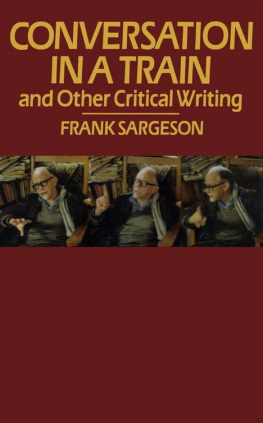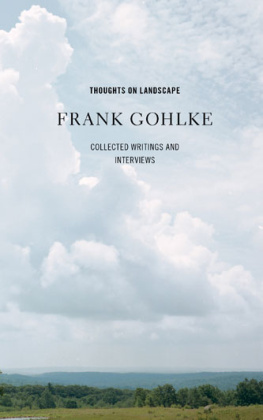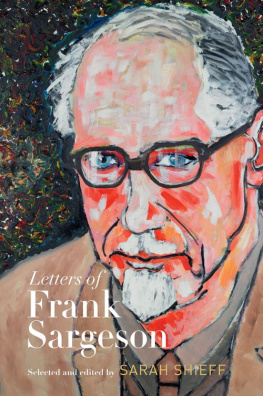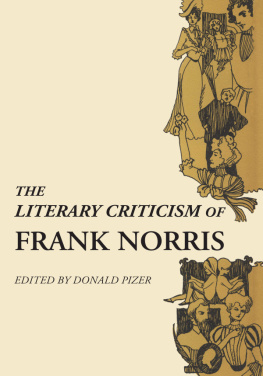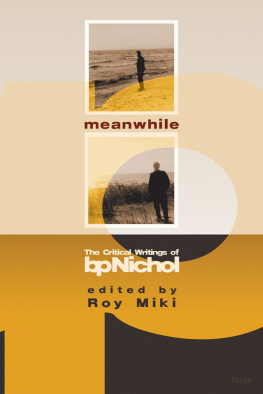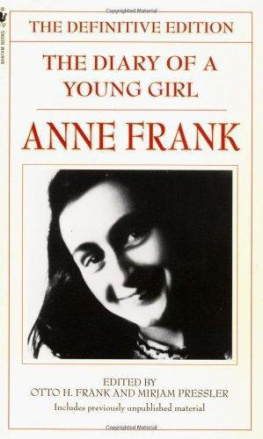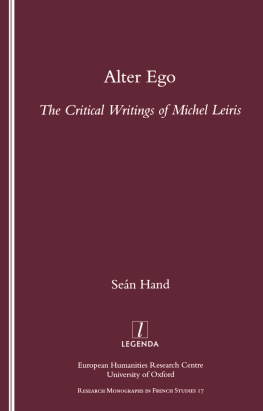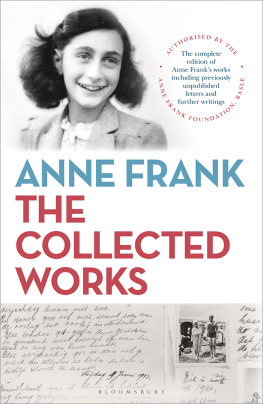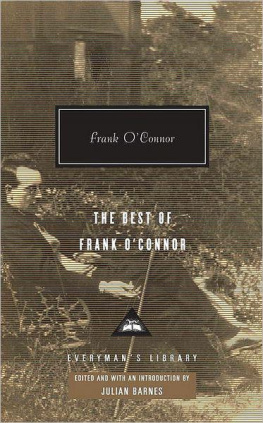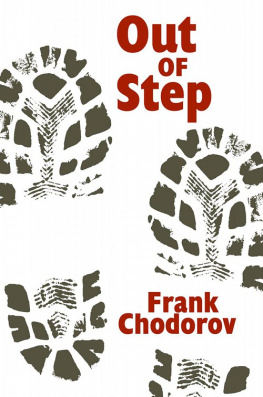Frank Sargeson - Conversation in a Train and Other Critical Writings
Here you can read online Frank Sargeson - Conversation in a Train and Other Critical Writings full text of the book (entire story) in english for free. Download pdf and epub, get meaning, cover and reviews about this ebook. year: 2011, publisher: Auckland University Press, genre: Art. Description of the work, (preface) as well as reviews are available. Best literature library LitArk.com created for fans of good reading and offers a wide selection of genres:
Romance novel
Science fiction
Adventure
Detective
Science
History
Home and family
Prose
Art
Politics
Computer
Non-fiction
Religion
Business
Children
Humor
Choose a favorite category and find really read worthwhile books. Enjoy immersion in the world of imagination, feel the emotions of the characters or learn something new for yourself, make an fascinating discovery.
- Book:Conversation in a Train and Other Critical Writings
- Author:
- Publisher:Auckland University Press
- Genre:
- Year:2011
- Rating:5 / 5
- Favourites:Add to favourites
- Your mark:
- 100
- 1
- 2
- 3
- 4
- 5
Conversation in a Train and Other Critical Writings: summary, description and annotation
We offer to read an annotation, description, summary or preface (depends on what the author of the book "Conversation in a Train and Other Critical Writings" wrote himself). If you haven't found the necessary information about the book — write in the comments, we will try to find it.
Conversation in a Train and Other Critical Writings — read online for free the complete book (whole text) full work
Below is the text of the book, divided by pages. System saving the place of the last page read, allows you to conveniently read the book "Conversation in a Train and Other Critical Writings" online for free, without having to search again every time where you left off. Put a bookmark, and you can go to the page where you finished reading at any time.
Font size:
Interval:
Bookmark:
My searching for Frank Sargesons critical writing began for a bibliography of his non-fiction prose prepared for the requirements of a Diploma of the Library School of the New Zealand National Library in 1977. That bibliography, in shortened form, is printed at the back of this book.
Frank Sargeson gave me generous assistance during and after that work, and in the selection of material for this edition. He answered many questions and gave me much useful advice.
Dennis McEldowney has been a patient and very helpful editor. Robin Dudding read the proofs, compiled the index, and assisted in other ways.
For permission to reprint material I am grateful to Frank Sargesons literary executor, to the editors of Islands,Landfall, the NewZealandListener, and ParsonsPacket, to Dr Allen Curnow, and to the Alexander Turnbull Library and the Broadcasting Corporation of New Zealand.
None of this work would have been possible without the help of Charlotte Paul.
Frank Sargesons critical, autobiographical, and occasional writings over forty-five years range very widely, from stray satirical notes to the major imaginative achievement of the three volumes of memoirs. In between is a considerable number of reviews, essays, commentaries, and interviews which tell us much of the remarkable writer he was.
I would often feel bitterly my regret that I began writing reviews. I can think of nothing more permanently damaging to a writer who has his own work to do, more likely to efface even a semblance of integrity, than that he should be required to drudge out comments upon books which he would never of his own volition have chosen to read: and all his work worry and doubt will be rooted in the knowledge that no matter how good his intentions, neither he nor anybody can ever be sure about the justice of a pretence to judge contemporary work. (MorethanEnough, p. 125.)
Sargesons critical and occasional writings in journals began in Tomorrow in 1935. Tomorrow had published Sargesons first sketches. He soon became a regular contributor to the magazine. I wrote for years for Tomorrow. I wrote as A Radical Man About Town; I wrote all sorts of comments and so on. It was almost like Wordsworth you know, Bliss was it in that dawn / but to be young was very heaven! (p.183 in this book).
Including his fiction, Sargeson made seventy contributions to the 178 issues of Tomorrow between 1935 and 1940, when wartime censorship closed down the radical Christchurch journal. A sense of common enterprise and excitement is obvious in Sargesons contributions, in his occasional pieces, verse, parodies, and commentary.
He wrote for Tomorrow because he wanted to: it did not pay contributors . That distinguishes his work there from his second burst of non-fictional activity between 1948 and 1955 when he published forty reviews and articles, most of them in the NewZealandListener. It is to that period that the quotation above refers. Further, during this period Sargeson did a considerable amount of broadcasting.
In MorethanEnough (pp.1245) Sargeson describes the circumstances in which he accepted reviewing work for the Listener from its editor, Oliver Duff. MorethanEnough also describes the end of his work for the journal, arising out of his dispute with M. H. Holcroft, who succeeded Duff as editor in 1949.
The activity of 194855 was from financial need. A scrawled note on the typescript of one of his radio talks reads I remember I did these to pay the damn rates. Sargesons Listener reviews were often merely brief notes on current books. This was never true of his contributions to Landfall during this period, where reviews and essays alike reflected Sargesons genuine interests, and were considered pieces of writing.
After 1955 what little reviewing Sargeson did was in Landfall and Islands, with a few more imaginative essays such as Conversation in a Train and An Imaginary Conversation. Interviews with Sargeson became more common in the nineteen-seventies, reflecting his considerable status as a fiction writer.
There is a great difference between a poet who seeks the particular for the sake of the universal and one who sees the universal in the particular . From the former method comes Allegory where the particular is used only as an example, an instance of the universal; but the latter is the true method of poetry. It expresses a particular without a thought of or a reference to the universal. But whoever has a living grasp of this particular grasps the universal with it, knowing it either not at all, or long afterwards.
Sargeson describes pinning this quotation from Goethe above his writing table in the nineteen-thirties (MorethanEnough, p.93). Quite apart from its obvious interest as a comment on Sargesons fiction, it furnishes a good example of the consistency of his interests. Among the essays included in this book it is alluded to in a talk of 1948 on Katherine Mansfield (see p.30) and quoted in an interview of 1970 (p.156). Elsewhere it is quoted in a review of a Karel Capek play in 1938, in a review of a book on the theatre in 1957, and in a reply to a questionnaire in 1975 (items 26, 96, and 121 in the bibliography). Particular ideas, names, and interests keep cropping up in Sargesons critical writings and reviews.
First is Sargesons interest in little Bethel, as he called it, that part of New Zealands social make-up which he saw as derived from a perversion of the non-conformist Christian spirit. This preoccupation of Sargesons was explored most fully in his fiction, if in more particular terms. He worried away at the subject in his critical and autobiographical writings over many years, and it was expressed in a variety of contexts: personal, historical, political, and imaginative.
In OnceisEnough he analysed its manifestations in the personalities of his own parents.
My father was in fact genuinely religious and moral: he believed in an order that was not of this world: my mother believed only in the worldly order which she considered to be the right and proper one: my father was the pure puritan who believed that all the heavenly absolutes as he conceived them could and should be made to prevail on earth: my mother was the impure puritan to whom the bargain of social convention was entirely satisfactory. My mother was indeed truly representative of the prevailing general sentiment about what life in New Zealand should bethe sentiment which powerfully shapes and dominates New Zealand life to this day (pp.9293).
Writing in 1950 of D. H. Lawrence, Sargeson identified the puritans ways of behaviour, which he thought Lawrence shared with New Zealanders, as a neurotic quest for perfection, a distrust of pleasure, and a social unease (see p.47). Sargeson sought to analyse the historical origins of this puritanism. His remarks on a collection of New Zealand short stories (pp.7177) are an attempt to trace the malady back to its imported English causes.
Puritanism in its political embodiment also concerned him. In his Landfall interview of 1970 he worried that now you have this drive for the view that every human being has his own dignity and his own rights and that he should share and so on; in extreme form you have the socialist idea that we should all be, economically, anyhow, equal. Now is this too a form of puritanism? I think it probably is (p.168).
Much of his writing on New Zealand literature is also concerned with the question of puritanism. Dan Davins
Font size:
Interval:
Bookmark:
Similar books «Conversation in a Train and Other Critical Writings»
Look at similar books to Conversation in a Train and Other Critical Writings. We have selected literature similar in name and meaning in the hope of providing readers with more options to find new, interesting, not yet read works.
Discussion, reviews of the book Conversation in a Train and Other Critical Writings and just readers' own opinions. Leave your comments, write what you think about the work, its meaning or the main characters. Specify what exactly you liked and what you didn't like, and why you think so.

